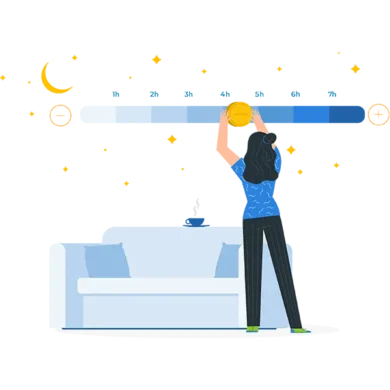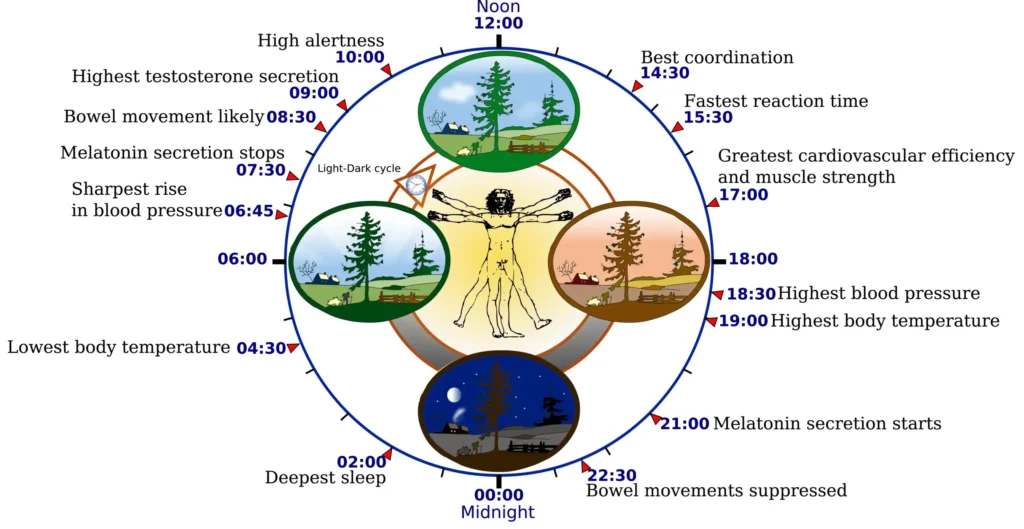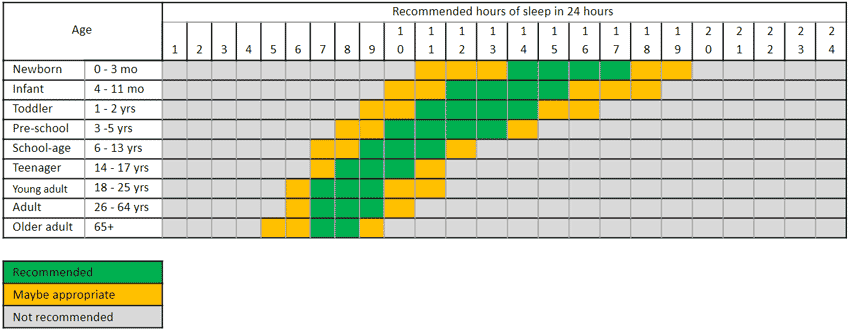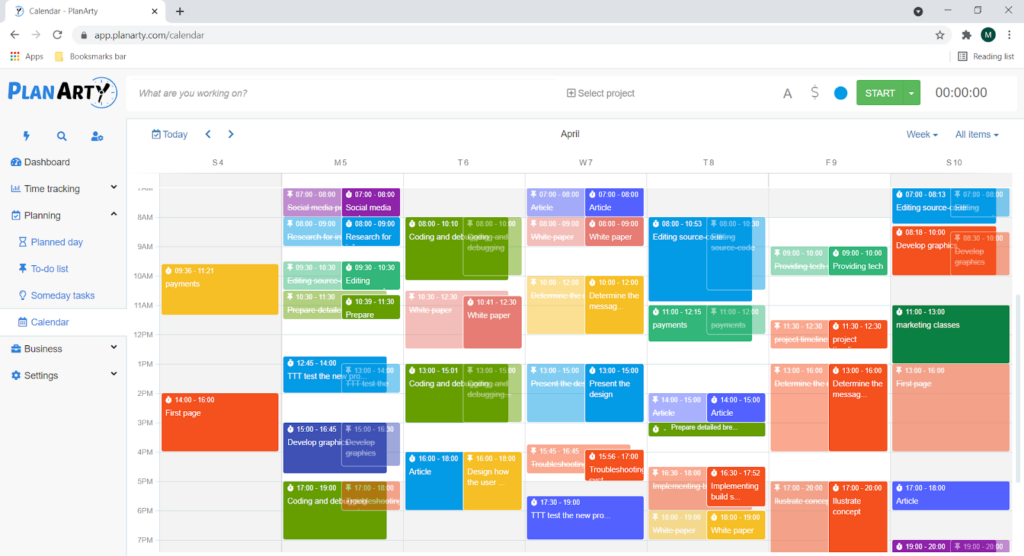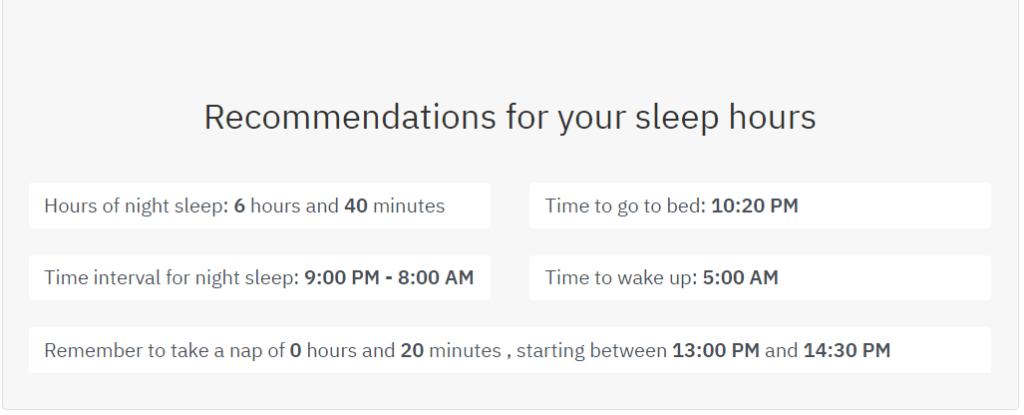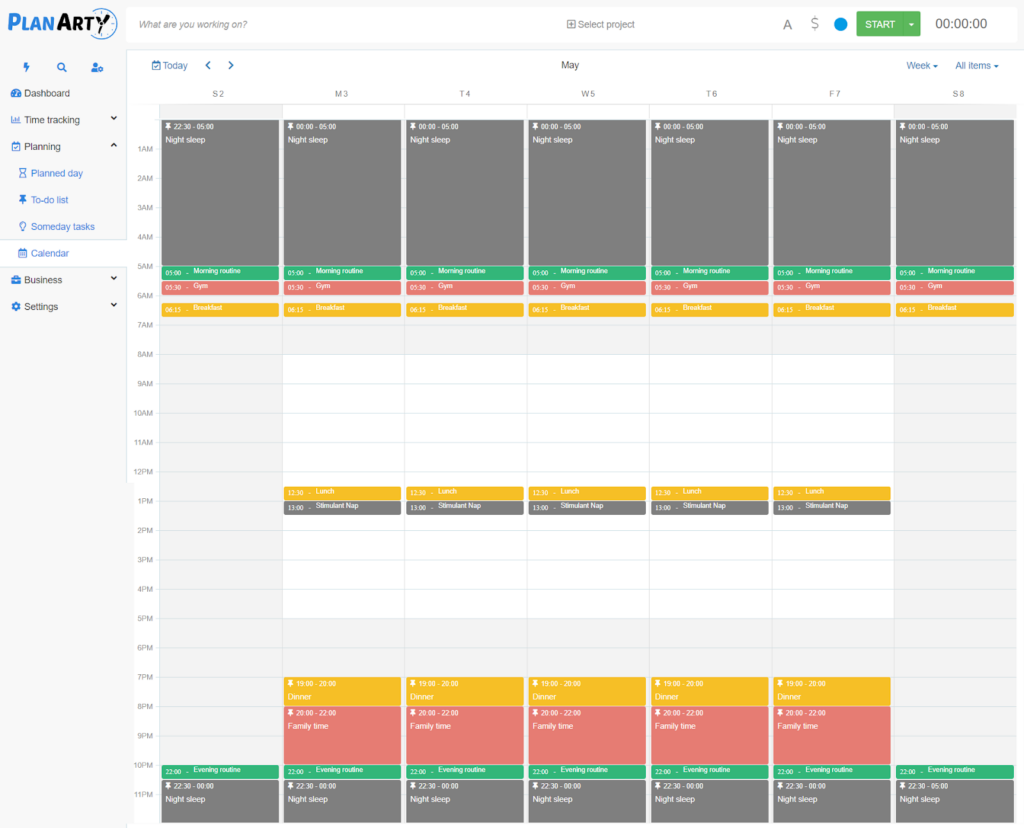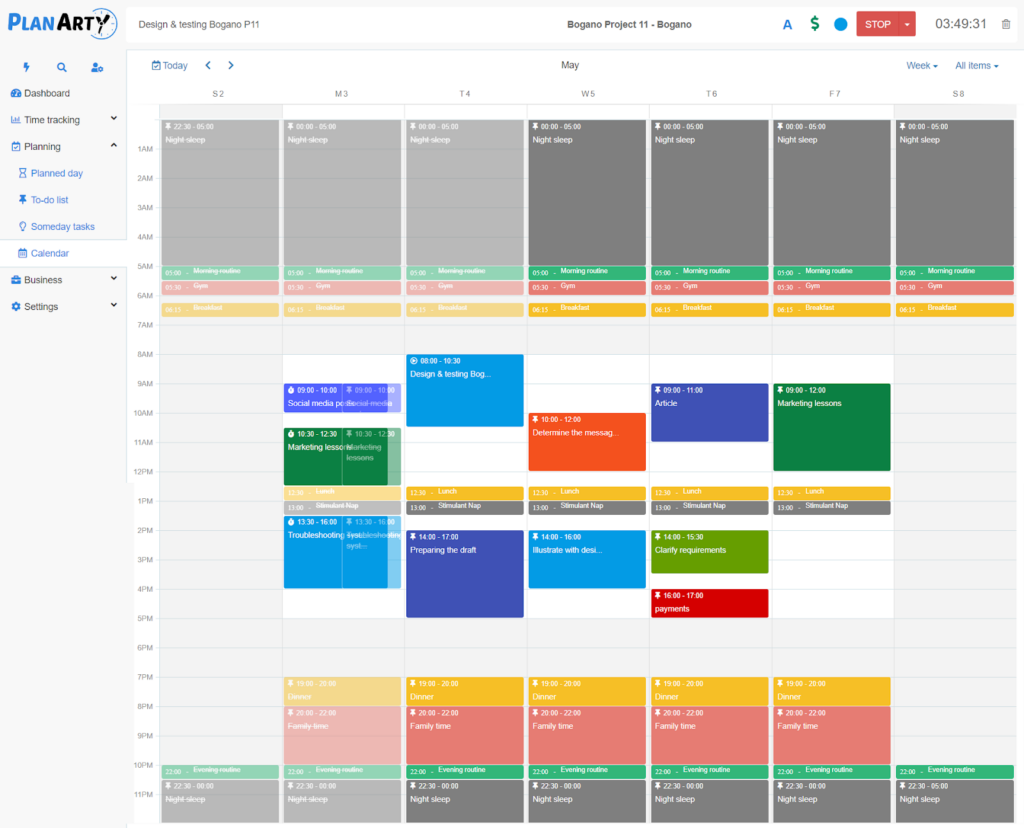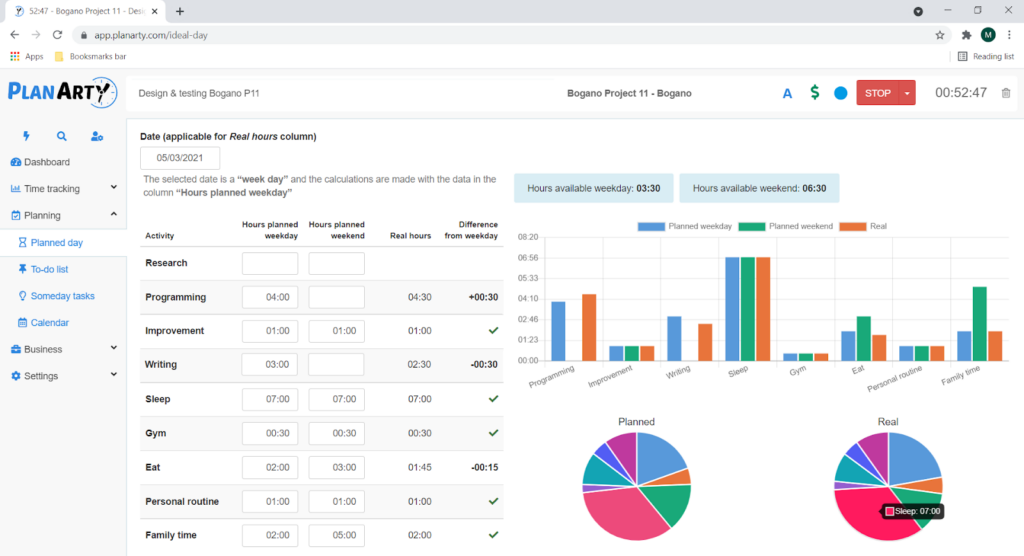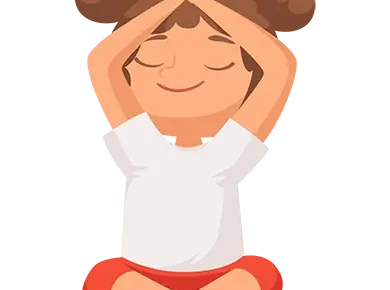PlanArty’s sleep calculator is a simple yet very useful tool that allows you to take advantage of the benefits of a regular sleep which includes the energy needed to better perform your daily tasks and fulfill your goals.
See on the Sleep calculator how many hours are recommended for you and plan them for a maximum productivity
Sleep Calculator
Disclaimer: Our recommendation provides only a general guideline. You may need to adjust the timing based on your experience.
What is a Sleep calculator good for?
A good night sleep
- positively influences our cognitive performance and we will be able to perform better
- increases the power of paying attention and we will focus more easily
- help us think clearly and we can make decisions faster
- stimulates our creativity and we will synthesize new ideas faster
- improve long and short-term memory and we will remember things very easily
The importance of these facts and the way they influence our daily life led us to create a sleep calculator
During sleep, our brain is repairing and growing cells, tissues, and nerves that regenerate and boost the hormone and immune system. Therefore, having restorative sleep is vital for optimal physical, emotional, and mental health. It helps us to perform much better in all respects of our life and increases our productivity.
Sleep is a vital physiological requisite for humans, needed for survival like air, water and food. Sleep loss, disruption of circadian rhythms, and work overload are critical fatigue-causing factors that can compromise safety and lead to increased errors and degraded performance and productivity. … Furthermore, costs in lost workplace productivity due to poor and insufficient sleep can be substantial
Risk of Performance Decrements and Adverse Health Outcomes Resulting from Sleep Loss, Circadian Desynchronization, and Work Overload
Factors that influence sleep
Circadian rhythm
By respecting the circadian rhythm, which is the internal rhythm of the body in terms of a sleep-wake cycle within 24 hours, we benefit from an energy boost that, through efficient time management, can be transposed into maximum productivity. PlanArty’s Sleep calculator takes this into consideration.
The circadian rhythm works perfectly when you have constant sleep and wake-up habits, like going to bed around the same hour every evening and waking up around the same time every morning. Since the circadian rhythm influences among other important bodily functions also the sleep-wake cycles and hormone release, disrupting it repeatedly can lead to various chronic health conditions like sleep disorders, depression or seasonal affective disorder.
Chronotype
A person’s chronotype is determined by the way that the circadian rhythm does manifest in human behavior and this changes over a person’s life cycle. Thus, almost all adolescents are ’Night owls’, then between 30-50 years the chronotype is evenly distributed among morning and evening people, and over 50 years most people become ‘Lark persons’.
The Morning (Lark) persons are those that tend to go to sleep early and wake up early. They thrive in activities that start early in the morning because it is when their level of energy is up and their productivity is best.
Evening persons or ‘Night Owl persons’ are people that prefer to go to bed well after midnight and also wake up closer to midday. Their energy level rises rather in the evenings and that is when they are most productive.
Designing the working hours according to chronotype means to benefit from maximum efficiency and productivity. This is why PlanArty’s Sleep calculator also considers it.
Sleep affects our physical and emotional well-being as well as our productivity
According to the latest National Sleep Foundation’s Sleep in America® poll, only 34-38% of people without a regular sleep can report feeling well-rested on weekdays. Compared to them, about 50-56% of Americans that maintain regular and consistent weekday sleep schedules report feeling the same. This means almost 1.5 times more people are feeling well-rested just for maintaining a consistent and regular sleep schedule.
Physical and emotional well-being, as well as productivity, are also affected by sleep. A percent of 39-46% of the people that answered the same pool states that changes in their sleep schedule influence the way they feel both physically and emotionally, as well as in terms of their productivity the next day.
| SLEEP VARIABILITY, SLEEP HEALTH, AND FEELING EXTREMELY/VERY WELL-RESTED | |||
|---|---|---|---|
| Average SHI Score | Well-rested, weekdays (%) | Well-rested, weekends (%) | |
| All | 77 | 47 | 54 |
| Weekday bedtime | |||
| Did not deviate | 80 | 56 | 63 |
| 30 minutes to 1 hour | 76 | 42 | 50 |
| More than an hour | 74 | 38 | 44 |
| Weekday wake time | |||
| Did not deviate | 81 | 54 | 60 |
| 30 minutes to 1 hour | 74 | 41 | 48 |
| More than an hour | 70 | 35 | 50 |
| Weekend bedtime | |||
| Did not deviate | 80 | 52 | 61 |
| 30 minutes to 1 hour | 76 | 45 | 50 |
| More than an hour | 70 | 34 | 40 |
| Weekend wake time | |||
| Did not deviate | 80 | 54 | 60 |
| 30 minutes to 1 hour | 75 | 42 | 48 |
| More than an hour | 70 | 37 | 46 |
The same poll discovered that 30% of the people with “excellent” sleep health chose to take a nap.
Types of naps
A nap is a good way to relax, improve mood, restore alertness, and enhance performance and very useful especially when nocturnal sleep was restricted to about 5 hours.
Brief naps have been shown to be at least as restorative as longer naps.
Power nap
An example of a short sleep during the day is a 20 minutes Power nap (included in Sleep calculator) and is meant to maximize the benefits of sleep versus time. The effects of this type of nap will be felt within minutes after waking up and last up to 2 hours after napping.
It also has been shown that in terms of improved alertness and performance for an hour following the napping, a 10 minutes sleep can be at least as recuperative as a 30-minute nap. More details about the power naps can be found in Amber Brooks, Leon Lack, A Brief Afternoon Nap Following Nocturnal Sleep Restriction: Which Nap Duration is Most Recuperative?, Sleep, Volume 29, Issue 6, June 2006, Pages 831–840
Stimulant nap
Another example is the Stimulant nap (included in Sleep calculator), which means that first is consumed a caffeinated drink and then is taken a 15-20 minute sleep. It takes up to half an hour to have an alerting effect from the coffee, therefore it will not influence the nap. After this type of nap, alertness is improved and also cognitive functioning. In this regard, it is definitely more effective than regular naps.
The idea of stimulant nap appeared in Driver sleepiness, by J.A Horne and L.A. Reyner, Sleep Research Laboratory, Loughborough University, Leicestershire, UK, a study that shows high inter-correlation between
Normal nap
Napping for more than 20 minutes can develop into a full sleep and become counter-productive due to post-sleep inertia. Therefore a normal nap (included in Sleep calculator) is one that stops before entering deep sleep or continues until the end of a natural sleep cycle which takes about 90 minutes. More than that it may sometimes be too much and it can affect the night’s sleep.
Also, it’s worth mentioning that depending on the timing of sleep within the day and sleep quality, sleep restorative properties may vary.
Noteworthy that time in bed and time sleeping are usually not the same, actual sleep time is typically less than time in bed.
Night sleep
Night sleep is what helps us recover properly so that the next day we feel rested and full of energy. This happens at night precisely because of the body’s natural internal rhythm – the circadian rhythm that regulates the intervals of activity and sleepiness of our body. In addition, including during the night, we experience several cycles of sleep.
The average sleep cycle is 90 minutes long and a typical night of sleep includes 5 full sleep cycles. This means we normally should take around 7.5 hours of sleep. But, we have to take into account that it may take a few good minutes to fall asleep and that during sleep there may be some other periods of wakefulness for various reasons.
What are the stages of sleep?
Each of the 5 sleep cycles mentioned earlier includes 4 stages. Of these, based on the analysis of brain activity during sleep, the first three were classified as NREM (non-rem sleep) and the fourth as REM (rapid eye movement).
To better understand how we rest when we sleep, here are the four stages of sleep and what happens to us during each of them.
- The first phase of sleep (N1) happens very soon after we close our eyes and start to relax. It is possible that at this stage we have involuntary movements of the muscles, due to the relaxation that occurs. It is the time interval in which we can still wake up easily and generally lasts between 3 and 10 minutes.
- As time passes, we will also pass into the second phase of sleep (N2). This one generally lasts between 10 and 25 minutes and involves a light, relaxing sleep. Even if at this stage we begin to disconnect from external stimuli, we can still wake up effortlessly. Precisely for this reason, it is recommended that the nap be about 20 minutes, in order to wake up while we are still in this stage of sleep.
- After this time we will pass for the next 20 to 40 minutes in stage three of sleep (N3), which is still non-rem like the first two. The difference is that in this stage of sleep our whole body is deeply relaxed and this allows its recovery and growth. A person awakened at this stage of sleep will feel slightly disoriented for a short time.
- The transition to stage four of sleep (N4) is easily identified by the appearance of a rapid movement of the eyes, although the eyelids are closed. Hence the name REM Sleep. This interval of about 10 minutes is very important in the development of our memory, thinking, and creativity.
It is worth mentioning that during the few full sleep cycles overnight, the duration of the 4 sleep stages changes. Thus, although in the first cycles it is possible for REM sleep to last only 5 minutes, in the morning its duration is prolonged. Also, in total, the sleep cycles have at the beginning of the night a duration between 70 – 90 minutes, and later in the morning, they end up lasting between 90-120 minutes.
It is also worth mentioning that a number of factors can influence both the duration of the 4 sleep stages and the number of full sleep cycles during a night. As we have already seen, among them are the circadian rhythm and a person’s chronotype. Other factors that influence our sleep may be related to our pre-bedtime activities, the conditions in which we sleep, or various chemical elements such as medications. We will also talk about them during the article.
Appropriate sleep ranges
Depending on age groups, there are some recommendations of appropriate sleep ranges that can help us scheduling sleep in a healthy range. We included these recommendations in the Sleep calculator.The recommendations are published in Sleep Health: The Journal of the National Sleep Foundation.
Signs you’re not getting enough sleep
As we have seen, a good night’s sleep helps the body and the mind to function in optimal conditions. Therefore, in its absence, we will feel the negative effects on our entire body.
What happens if we don’t get enough sleep for a short period of time?
Suppose we sleep for a few nights, but not enough. If it only happens for a short time, most likely, we will not even feel the negative effects of this.
However, the negative effects of lack of sleep will be noticed when this happens several nights in a row and fatigue accumulates. This means that our body failed to perform its restorative functions during the night. As a result, if we do not get enough sleep for longer, we will notice that we become more irritable, that it is harder for us to concentrate, or that we have partially lost our dexterity.
About the same things will happen if we don’t sleep one night at all.
In both situations, it will be more difficult, but not impossible for us to carry out our daily activities. The good news is that we will recover quite easily as soon as we sleep enough and well so that our body recovers.
What happens in the long run if we don’t get enough sleep
If we do not rest enough for a longer period of time our body will feel many and intense negative effects. It is possible to
- develop various heart or blood pressure disorders
- become more susceptible to various diseases because our immune system will be weakened
- gain weight because we will be tempted to eat more to make up for our lack of energy
- have problems with memory and learning
Recovery in this situation will take some time and involves establishing and adhering to a regular sleep schedule.
But if the lack of sleep is total for more than 48 hours, among the negative effects that are installed on physical and mental health are hallucinations, anxiety, and depersonalization.
A consistent sleep routine is what will help us sleep well and enough so that our body functions at optimal parameters.
How To Improve Sleep
As we already presented, sleep is our body’s first line of defense not only against fatigue but also infectious and potentially fatal diseases. That’s because when we doze off, our body produces proteins called cytokines, which help fight off inflammation and infection so we don’t get sick.
Normally, if our immune system is exposed to harmful pathogens or even stress, our body produces cytokines to offset them. However, when we are sleep-deprived, this response is hindered, which increases our chances of catching illnesses. That is probably why you get colds more often than others!
Needless to say, lack of sleep can compromise your immune response and allow diseases to take hold. This can happen if you have poor sleep hygiene. Sleep hygiene refers to behaviors and habits that are necessary to acquire quality sleep to ensure we remain alert during the day.
Signs of Poor Sleep Hygiene
Memory and Focus Issues
When we sleep, our brain forms neural connections that can help us process information and remember it later. If you have poor sleep hygiene, chances are you are forgetful and have trouble focusing at work. Similarly, you may also have trouble coming up with solutions to the simplest problems and can get into accidents easily.
Mood Swings
Poor sleep hygiene and sleep deprivation can make you hot-tempered, moody, and emotional. If left untreated, this can lead to depression and anxiety over time.
High Blood Pressure
If you sleep less than five hours at night, your risk of getting high blood pressure increases. In time, this can lead to heart conditions or worse, a stroke.
Weight Gain
If you are sleep-deprived, your brain fails to realize that you are full when you are eating. As a result, you are more likely to binge or overindulge to the point that you start gaining weight.
Reduced Sex Drive
Your libido can weaken if you don’t sleep enough hours a night without interruption. In men, a decreased sex drive is typically due to a drop in testosterone levels.
Poor Balance
If you walk in a daze during most of the day or trip and fall quite often, you are sleep-deprived. Lack of sleep can affect balance and coordination, which can make you prone to accidents.
Tips for Improving Your Sleep Hygiene
Good sleep hygiene practices can help you avoid the aforementioned symptoms and remain alert and productive throughout your workday. Here are some sleep hygiene habits you should adopt to ensure this:
Sleep Hygiene Tip #1 – Set your Body Clock
Your body’s internal clock determines when you feel tired enough to go to bed and how productive you remain. To maintain a healthy routine, go to sleep at the same time each night. This includes weekends, no matter how much you want to stay up and binge a show on Netflix.
If you do this successfully, your internal clock, as well as, the hormones that control your state of sleep and wakefulness, will harmonize. This will take some time to perfect in the beginning. You may even have some sleepless nights. However, if you stick to the same routine for some time, you will start getting extremely sleepy as soon as your bedtime rolls around.
Plus, do not disrupt your daytime routine even if you have trouble sleeping at night. Naps can disrupt your routine and you won’t feel sleepy at night. You can go to bed earlier than you usually do to catch up. That way, you can get up at the proper time the next day, refreshed.
Sleep Hygiene Tip #2 – Start Winding Down When Bedtime Rolls Around
If you feel charged up before bedtime, your brain won’t let you sleep for hours when you lie down. So before that time rolls around, spend an hour of quiet time with yourself. Read a book, have a warm bath, or listen to soft music to ease your stress.
When you are good and relaxed, make sure your bedroom is dark and quiet before sleeping. The sheets should be comfortable and the pillow should be fluffed up. If you feel a bit hungry, have a light snack before bed. Hunger pangs can interrupt your sleep and you may wake up feeling as tired as you were before.
Just don’t have a heavy meal. A warm glass of milk should be sufficient. The tryptophan in the milk is a natural sleep inducer, which should relax you.
Sleep Hygiene Tip #3 – Unplug an Hour Before Bed
The more screen time you have, the longer it will take you to fall asleep at night. Before heading to bed, limit your use of smart devices at least an hour beforehand. The light can disrupt your internal clock and the emails, social media posts and games will keep your mind active.
Prevent that from happening by keeping your phone out of reach by keeping it in another room. If you need it (for the alarm, for instance), switch it to Airplane Mode or nighttime mode to block vibrations and the light if you receive notifications. You can also keep it face down on your nightstand for the same effect.
Sleep Hygiene Tip #4 – Don’t Watch the Clock
If you stare at the digital clock on your bedside table or your cell phone every half hour, you are ruining your sleep. The bright light will interrupt your circadian rhythm by fooling your body into believing it is daytime. In other words, you will go to bed with a stressed mind and will wake up as tired as you were before.
Prevent this from happening by turning the face of the clock away from you and turning your phone face down. If you wake up in the middle of the night and cannot return to sleep for 20 minutes, get up. Do some light reading or listen to some soft music, instead. Do NOT grab your cell phone! You will remain awake until the wee hours of the morning then. When you cannot keep your eyes open, then turn over and doze off.
Sleep Hygiene Tip #5 – Do Some Light Exercise
If you are too restless to go to sleep at night, do some light exercise to tire yourself out. A small workout will also encourage your body to release sleep hormones called melatonin. Just time these small exercises wisely.
If you work out too close to your bedtime, you will be too full of adrenaline or stimulated to fall asleep quickly. Do some light stretches or yoga an hour beforehand. It will allow your body and mind time to wind down as well. Better yet, maintain a morning workout regime. At the end of the day, you will crash as soon as your bedtime rolls around without adrenaline keeping you awake.
Our sleeping habits define how we spend each day. Poor sleep hygiene can make you tired at work when your mind should be alert. The aforementioned tips should help you prevent this for a healthier lifestyle.
Optimize Your Bedroom for Better Sleep
We spend almost a third of our 24 hours a day in our bedroom. Therefore, if we want to spend quality time in this room, we should pay close attention to the way it is arranged.
First of all, let’s establish very clearly that the bedroom must provide the perfect environment for a good sleep. From this point of view, we will have to take into account
Use warm, relaxing colors
Both the walls of the room and the color of the furniture or bedding must be one to our liking, which will relax us and invite us to sleep. If when we enter the bedroom we see in front of our eyes a red wall or a painting depicting scenes from the war, this will shake us, even without realizing it. Pastel colors and paintings with beautiful landscapes are preferable.
Furnish the room properly
The expression “less is more” is valid in this situation as well. The bedroom should include the furniture necessary to provide the necessary comfort, order, and calm for a bedroom. Overloading the room with things that are not related to rest, or a permanent mess will affect us negatively.
Comfortable mattress and pleasant bedding, comfy pillows, sheets, and blankets
Definitely, for a restful sleep, we need a good bed and a comfortable mattress. But just as important are the pillows, bedding and blankets used. All this must be to our liking, clean and beautifully arranged according to the situation. When we want to sleep we prepare the bed for sleep, and in the morning we arrange it nicely. This will help us to mentally enter the necessary state of rest in the evening or to animate ourselves in the morning.
Adequate light and quiet
It must be dark in the bedroom during the night, and in order to fall asleep easily we should give up using electronic devices some time before bedtime. Their brightness will delay the time we fall asleep. In addition, we could be distracted by using them. Instead, it will help us a lot if before bed we read a few pages of a book to our liking.
Although the dark is recommended for the night, during the day we must let the light and the sun enter the bedroom.
Air quality, temperature, and smell
An airy bedroom, with a low temperature and a pleasant aroma, will make us sleepy as we enter. We sleep deeper and rest much better when the environment is colder than when it is warmer and we tend to sleep restlessly. Therefore, an airy, cool bedroom with a light scent to our liking will facilitate quality sleep.
Plan your sleep hours
To truly enjoy the benefits of good sleep, it is not enough to just find out how many hours of sleep you should sleep or in what time frame. It is also very important to include these hours in your daily schedule and follow them. Otherwise, it is very easy to engage in other activities and because at some point it may seem that you do not have enough time, you may be tempted to reduce sleep hours.In PlanArty I do my planning directly in the Calendar. This way I avoid overloading the daily schedule or overlapping tasks. I like to use it because it’s easy to create new to-do list items right there or to adjust the schedule with drag & drop.
In addition, seeing the big picture of the daily program helps me a lot from several points of view:
- Seeing my daily schedule helps me mentally prepare for the next day
- I can choose to see only the to-do list items, both the just planned and the already donned ones and this gives me moral support when I see the daily achievements.
- I select to see only my time-tracking records to understand exactly how I spent my time
- Choosing to display both my time-tracking records and my to-do list items, helps me to discover my flaws in time management and take the necessary measures.
I entered in the Sleep calculator my age group, the fact that I am a morning person and I want to sleep 7 hours a day and wake up at 5 am, also that I like to take a nap stimulant, and I got the following recommendations:
- Hours of night sleep: 6 hours and 40 minutes
- Time interval for night sleep: 09:00 PM – 08:00 AM
- Time to go to bed: 10:20 PM
- Time to Wake up: 05:00AM
- A 20 minutes nap: between 13:00 PM and 14:30 PM
I know from previous experiences that if I am not well-rested, I cannot perform as well as I want, it feels like I do not have enough energy. This makes me unable to concentrate enough and work efficiently, so some activities take me longer than I should. Therefore I fall behind with some things and am tempted to give up rest times (or sports) to catch up. But that makes me enter a vicious circle because the next day I will be tired again because I didn’t get enough rest, and so on.
Given these things, when I plan next week I make sure that before planning other activities, I block the time intervals needed for night sleep and daily naps. I do the same thing with the time needed for daily activities such as my morning and evening routines, sports, family time, or dining. This is how I make sure I have all the conditions to perform at full capacity.
As I said, I do this directly in PlanArty’s Calendar, and this is what the beginning of weekly planning looks like in my case.
Daily schedule and time tracking
After that, I continue to plan everything I have to do, in the order of the priorities that I consider appropriate. As I start working on the planned activities, click Start on them and the related time-tracking record is initiated. And once I have finished working on a to-do item, I mark it as “done.”
Also in Calendar select the option to display both my To-do items and Time-tracking records. These are marked with identification Icons, and the activities already performed are displayed in a different color. Thus, I can see at any time what is the exact situation of my activities and, if necessary, I can take the necessary measures in a timely manner.
Time accountability
Once I’ve made my plans and tracked my time, I turn to the Planned vs. Real that I make sure I keep myself on track. For example, as it turned out to use the Sleep Calculator, I planned to sleep 7 hours a day, spread over 6 hours and 30 minutes at night, plus a 30 minutes Stimulant nap stimulant after lunch.
In addition to the hours of sleep, I set a number of hours for certain professional activities that I have to do daily. For example, I want to make sure that I dedicate about 4 hours a day to programming and that I allocate 3 hours a day to writing. Note that these activities are not included in my weekend schedule.
The objective comparison is displayed both numerically and visually (in the two charts). This is how I can clearly see the difference between what I set out to do and the time that I have spent in reality with those activities. It is also taken into account that my schedule on a weekend day is different from that one of working weekdays.
It is very clear that I respected my hours of sleep and the time I set out to spend with my family. However, the same did not happen with my writing or programming. In these cases, on the selected date, for each, I worked 30 minutes less than I had intended.
The big advantage is that I can view this situation at any time, even during the day. This way, if necessary, I can make the necessary adjustments on the go, so that I can get back on track in no time.
The bottom line is that once I’ve calculated my sleep hours, I need to include them in my daily planning and make sure I respect them. This is the only way I will have the level of energy, inspiration, and productivity I need to work efficiently and reach my goals. And I do that. What about you?
